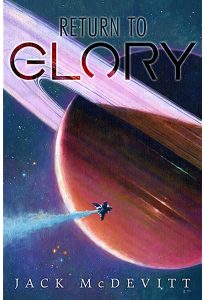Russell Letson Reviews Return to Glory by Jack McDevitt
 Return to Glory, Jack McDevitt (Subterranean Press 978-1-64524-073-0, $50.00, 569pp, hc) October 2022. Cover by Edward Miller.
Return to Glory, Jack McDevitt (Subterranean Press 978-1-64524-073-0, $50.00, 569pp, hc) October 2022. Cover by Edward Miller.
Jack McDevitt has been producing SF for more than four decades now, two dozen novels and enough shorter work to fill five previous collections with remarkably little overlap on the contents pages. Now there is a substantial sixth retrospective volume, Return to Glory, which gathers 32 stories from the whole long stretch of his career, from 1981 to 2022, and adds five pieces new to this volume. (And some of the older stories seem to have been lightly edited to introduce more timely political and cultural references.)
The book is divided into five sections with theme-signaling headings – Unlikely Gifts, Deep Space, High Hopes, Incoming Tech, Looking Back – but there are motifs and ideas that run across and through these divides, particularly one identified by the title of Tom Easton’s introduction: “Dangerous Information.” Myself, I’d call it “News from Out There.” There is a tension in McDevitt’s work between the familiar science-fictional urge to discover a universe filled with intelligent life – to have conversations with Others – and the sober and sobering possibility that we are alone, either because we are unique or because intelligent life is so rare, fragile, and fugitive that we might as well be, leaving humankind rattling around in ruins and otherwise empty worlds.
In any case a galaxy filled with Others might not be all that friendly or safe. This has been a signature motif from very near the beginning of McDevitt’s career. The collection’s longest item is “Voice in the Dark” (1986), a novella-length section of his first novel, The Hercules Text, which addresses the moral and practical-political issues following the reception of messages from a far-off and certainly long-dead civilization. In the foreword to the 2015 reissue of the novel, McDevitt confessed to “the suspicion that we do not really want to hear from the stars. No matter how hard we root for SETI. And no matter what the outsiders may have to say to us. No news is good news.”
For example, “Tidal Effects” (1985, also set in The Hercules Text world) and its thematic cousin “The Oppenheimer Club” (2022) are what might be called Pandora’s Box stories, in that the characters wonder whether their discoveries offer more dangers than benefits. And in “Tau Ceti Said What?” (2021), “Tea Time with Aliens” (2019), and “The Cassandra Project (2011), the actual news from Out There explains why the galaxy is empty of organic star-spanning civilizations, and in neither case is it a comforting vision.
Nevertheless, McDevitt’s characters keep looking and hoping to find marvels and adventure Out There, as in “Return to Glory” (2020), in which enthusiasm for interstellar travel is rekindled by the discovery of what seems to be a lost episode of Star Trek. And even when humankind is alone or nearly so, wonders and adventures are still available, as in the long-running Academy/Priscilla Hutchinson and Alex Benedict series, which are filled with explorations, dramatic discoveries, riddles solved, and disasters averted or escaped. Problem-solving space pilot Priscilla Hutchinson puts in an appearance in “The Cat’s Pajamas” (2012), even though she is not the one who devises the ingenious rescue this time; and Chase Kolpath of the Alex Benedict series nearly gets herself canned for taking big risks in an anomalous first-contact situation in “What’s the Point of Being Alive if You’re a Tree?” (2022; from the forthcoming novel Village in the Sky). The Academy future is also the setting for the private-eye mystery “The Big Downtown” (2005), in which the vanished-civilizations background and a painting of an enigmatic alien figure prominently (and Hutch gets a winking name-check).
McDevitt’s work has always mined a wide range of science fiction and fantasy lodes, and the stories in this collection reflect some of that variety: telepathy (“Crossing Over,” 1983), alternate universes (“Variables,” 1997), time travel (“Timely Visitor,” 2021), the end of the world (“Cosmic Harmony,” 2022), apparent ghosts (“Holding Pattern,” 1997), and even a horror-story twist on the questions that generated James Blish’s A Case of Conscience (“Leap of Faith,” 1989).
But there are often strains of irony and melancholy in McDevitt’s treatments, particularly in his portraits of people who find themselves just off to the side when great discoveries are made or heroic projects undertaken. That is the strain that I found most striking in this collection: stories less of heroics than of the day-to-day work of scientists and the managers and bureaucrats who keep the research machines operational, and of the tension between the scale of discoveries and the lives of the people who make them – or who almost make the big splash, or who only work off to the side. The keynote story here is probably “Voice in the Dark,” which pushes the mundane-cosmic contrast very hard and establishes what becomes a familiar pattern: an account of something of enormous, even cosmic import is embedded in the most ordinary of life-matters – a failing marriage, a sick child, the waxing and waning of careers.
Quite a few of McDevitt’s characters suffer from variations on what might be called the not-quite-good-enough syndrome. A version of it shows up in the volume’s opening (and earliest) story, “The Emerson Effect” (1981), with its repressed, withdrawn, wistful postal worker and his inexplicable teleportations. In “Riding with the Duke” (2015), new video technology lets an insecure, struggling physics teacher (interestingly named Walter Peacock) literally see himself as heroic – as Paul Henreid in Casablanca or John Wayne in Rio Bravo – and to find his feet and become a more confident and effective teacher. (And the portrait of the strains and challenges of the classroom is spot-on.)
Other stories portray the disappointments of failing to be in the first ranks of researchers. In “Standard Candles” (1994), the protagonist “saw his time running out. It wasn’t that he was getting older, but he knew that talent, genius, if it is present, manifests itself early…. He had begun to fear that he was only a mediocrity, someone to hold the reins for Achilles.” The heart of the story is less in scientific discoveries than in the ways that trajectories of career and marriage intersect and diverge – and it’s the marriage that suffers. Even when catastrophe looms, as in “Enjoy the Moment” (2014), frustrated ambition dogs the discoverer. And the irony of the narrator of “Bring on the Night” (2022) having an award named after him is that he discovered not the solution but the possible disaster that the winners are being honored for averting:
I know now that I was never talented enough to be an exceptional physicist. The genius I’d hoped to become never showed up. But I went looking for a comet, something I could maybe put my name on, and found instead an existential threat.
So we listen to the stars and hear nothing – or unwelcome news. We go Out There and find ruins or empty worlds. We aspire to unlock the secrets of the universe and watch smarter people find the key. But if we’re lucky, like Walter Peacock, we find who we can become and we cope. And there are still adventures to be had and wonders to encounter. I’ve come to see the intertwining of the cosmic, the mundane, and the domestic, of ambition and recognition of our limits, as a McDevitt hallmark, a way of understanding with what Robert Frost calls “our place among the infinities.” And like Frost, McDevitt seems to recognize that even when we look up at the stars, we are standing on our own feet, on the ground where we remain rooted.
Russell Letson, Contributing Editor, is a not-quite-retired freelance writer living in St. Cloud MN. He has been loitering around the SF world since childhood and been writing about it since his long-ago grad school days. In between, he published a good bit of business-technology and music journalism. He is still working on a book about Hawaiian slack key guitar.
This review and more like it in the January 2023 issue of Locus.
 While you are here, please take a moment to support Locus with a one-time or recurring donation. We rely on reader donations to keep the magazine and site going, and would like to keep the site paywall free, but WE NEED YOUR FINANCIAL SUPPORT to continue quality coverage of the science fiction and fantasy field.
While you are here, please take a moment to support Locus with a one-time or recurring donation. We rely on reader donations to keep the magazine and site going, and would like to keep the site paywall free, but WE NEED YOUR FINANCIAL SUPPORT to continue quality coverage of the science fiction and fantasy field.
©Locus Magazine. Copyrighted material may not be republished without permission of LSFF.






